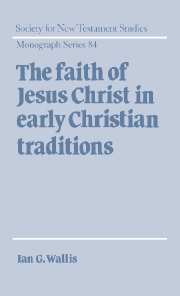Book contents
- Frontmatter
- Contents
- Preface
- Convention for referring to primary and secondary literature
- List of abbreviations
- 1 Setting the scene
- 2 Jesus' faith in the Synoptic Gospels
- 3 Jesus' faith in the Pauline Epistles
- 4 Jesus' faith in the deutero-Pauline and Pastoral Epistles
- 5 Jesus' faith in Hebrews and Revelation
- 6 Jesus' faith in extra-biblical sources
- 7 Concluding remarks
- Select bibliography
- Index of modern authors
- Index of passages
- Index of subjects
2 - Jesus' faith in the Synoptic Gospels
Published online by Cambridge University Press: 22 September 2009
- Frontmatter
- Contents
- Preface
- Convention for referring to primary and secondary literature
- List of abbreviations
- 1 Setting the scene
- 2 Jesus' faith in the Synoptic Gospels
- 3 Jesus' faith in the Pauline Epistles
- 4 Jesus' faith in the deutero-Pauline and Pastoral Epistles
- 5 Jesus' faith in Hebrews and Revelation
- 6 Jesus' faith in extra-biblical sources
- 7 Concluding remarks
- Select bibliography
- Index of modern authors
- Index of passages
- Index of subjects
Summary
Preliminary considerations
In the previous chapter, we observed how nascent Christianity inherited certain ways of articulating faith. Faith already had its own vocabulary in the form of the πιστεύω group and the 'āman root, which could denote – amongst other things – various aspects of human–divine relationship. We also noted how faith could be expounded in narrative form by reflecting on the lives of Israel's great exemplars. And following on from this, we recognised the importance within Jewish traditions of the phenomenal dimension of faith, which was rooted in experience rather than in abstract thinking.
These then are some of the characteristics delimiting the background against which early Christian traditions should be interpreted. We shall, therefore, make recourse to this heritage throughout our investigation and, in order to gain perspective for the present chapter, a number of corollaries need to be made. Firstly, although the resurrection certainly influenced the way in which faith came to be understood and articulated in Christianity, it is not the birth of faith. For one thing, we have seen how faith had already come to expression in Jewish and Graeco-Roman environments; for another, the resurrection itself assumes the existence of a community of faith without which its effects could not have been received or interpreted. Had there been no disciples of the earthly Jesus, post-crucifixion experiences of that same person raised from the dead would have been impossible.
- Type
- Chapter
- Information
- The Faith of Jesus Christ in Early Christian Traditions , pp. 24 - 64Publisher: Cambridge University PressPrint publication year: 1995

